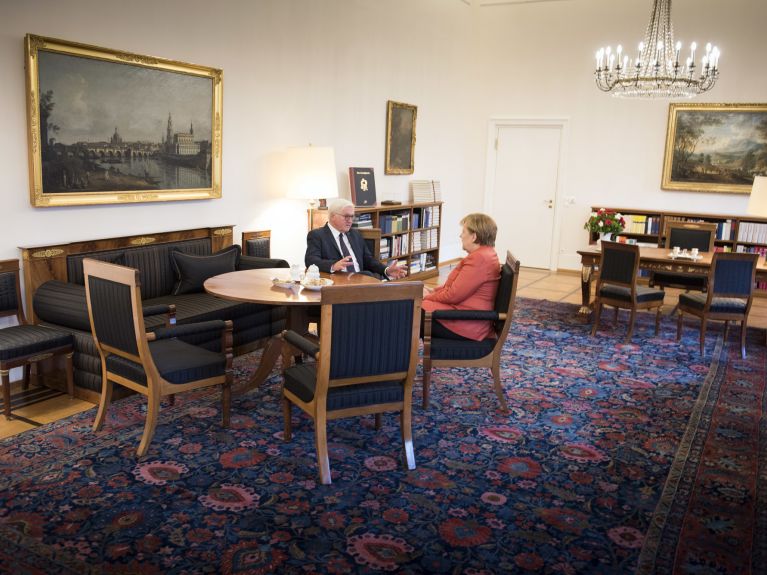What comes after Jamaica?
What happens next in Germany now that the exploratory talks between the CDU/CSU, the FDP and the Greens have failed? Here are some answers to the most important questions.

Why does Germany still not have a government eight weeks after the Bundestag elections?
Late on the evening of 19 November, after four weeks of intense talks, the FDP broke off negotiations with the CDU, the CSU and the Greens on the formation of a Jamaica coalition, so-called because the political parties’ traditional colours are the same as those found on the Caribbean country’s flag. The FDP says that over 237 points, including “central issues”, were still disputed at the end. The other negotiating partners view the situation differently. Nevertheless, without the FDP there can be no Jamaica coalition.
How strong is the government at the present time?
The chancellor and ministers continue to serve in an acting capacity and from the legal perspective therefore still have the same powers as a “regular” government. Previously, however, it has become customary during such periods not to take any far-reaching decisions that place binding obligations on a later Federal Government. When it comes to important decisions, the government can only act by passing legislation, which requires a majority in parliament. The Basic Law stipulates what happens if parliament is unable to adopt a budget for the next fiscal year. According to Article 111, the Federal Government “may make all expenditures that are necessary to maintain institutions established by a law and to carry out measures authorised by a law”. In any event, the Federal Government continues to have full authority to act until a new government has been formed.
What does Angela Merkel say?
She made her views clear in an interview she gave to German television on Monday evening: she is sceptical about a minority government. She considers new elections the better course of action and would be available as a candidate. One year ago she stated that she was standing for a further term of office, “therefore, it would be rather strange” if two months after the elections she suddenly told voters: “That is no longer the case.”
What is the disadvantage of a minority government?
Minority governments involve hard work. The government would have to put together a new majority in parliament for every single decision because it did not have its own. This would be a difficult undertaking requiring great willingness to engage in discussion and compromise. However, Angela Merkel values stability and dependability, which would not be given in the event of a minority government. Previously in Germany such a situation has only existed at the federal level for a very short time and in exceptional circumstances, for example, following the breakup of a coalition.
What happens next?
Speaking on Monday, Federal President Steinmeier announced he intended to talk with all party leaders – including the SPD, which has so far rejected a continuation of the grand coalition that has been in power for the last four years. Steinmeier said he expects “all parties to show a willingness to engage in discussion to make the formation of a new government possible in the foreseeable future.”
If there are new elections, how will they come about?
In any event, Federal President Frank-Walter Steinmeier must propose a candidate to the Bundestag for election as chancellor. Should parliament not approve this proposal by an absolute majority in the first ballot, further ballots can be held in the following two weeks, but they also require an absolute majority. Only then, if no decision has been achieved, must a ballot follow that can elect a chancellor by a simple majority, and the Federal President can then appoint the chosen candidate as head of a minority government. Alternatively, he can dissolve the Bundestag and therefore bring about new elections, which would have to be held within 60 days.
And what do the Germans say?
A quick poll by ARD-Deutschlandtrend found that 57% of citizens were disappointed that a Jamaica coalition had not been formed. If a grand coalition is not possible, 63% of the people surveyed are in favour of new elections. Only 29% were in favour of a minority government.